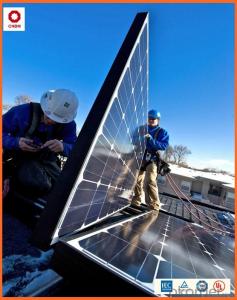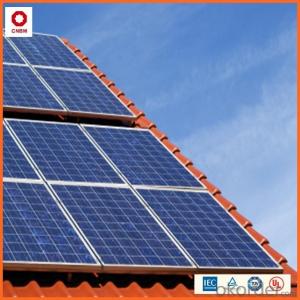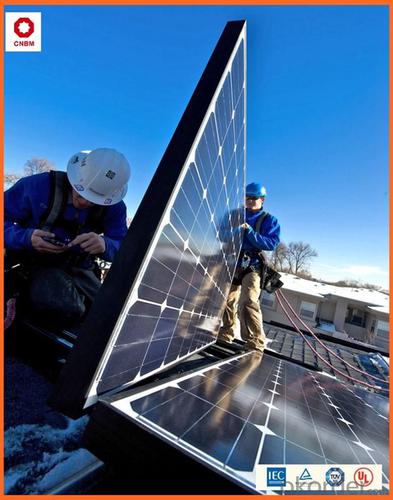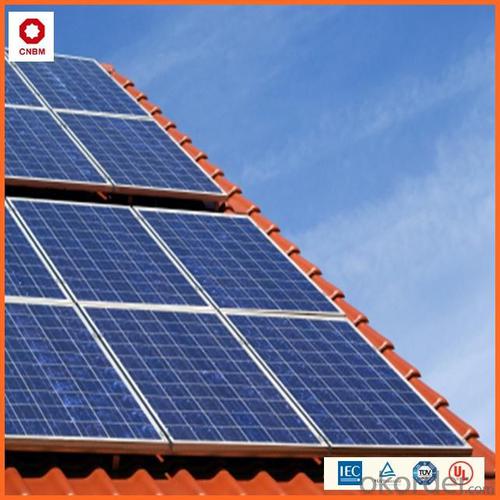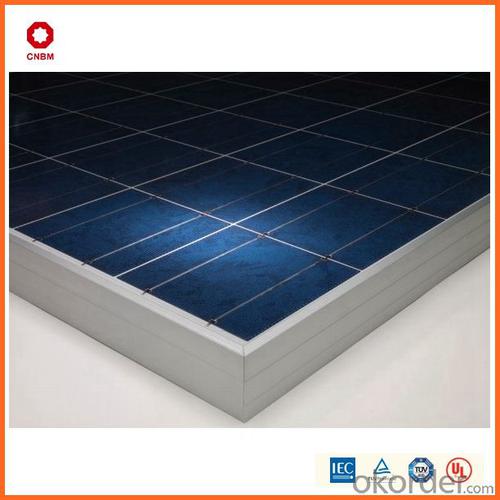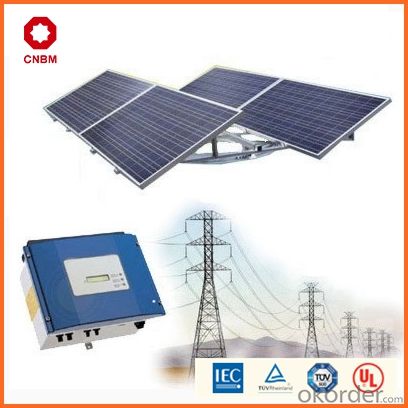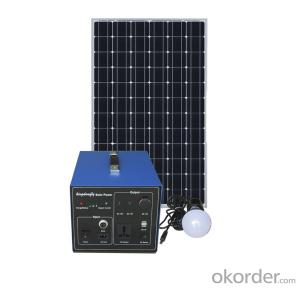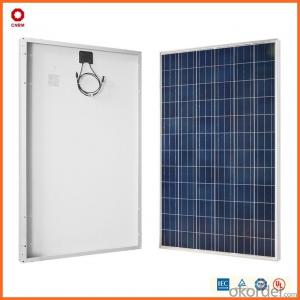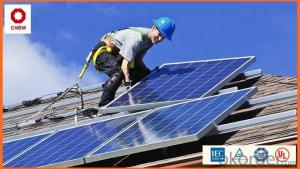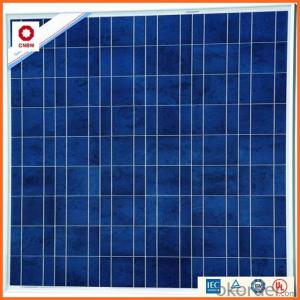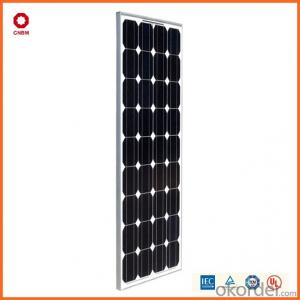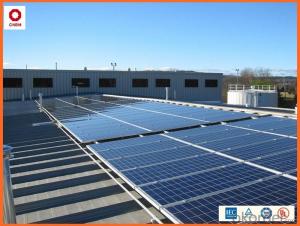Maryland Solar Energy Systems 45w Small Solar Panels in Stock China Manufacturer
- Loading Port:
- China main port
- Payment Terms:
- TT OR LC
- Min Order Qty:
- 1 watt
- Supply Capability:
- 10000000 watt/month
OKorder Service Pledge
OKorder Financial Service
You Might Also Like
Specification
Product Description:
Hot Sale !!! Quality and Safety of Small Poly Solar Panel 5w~150w
1. Rigorous quality control meets the highest international standards.
2. High-transmissivity low-iron tempered glass, strong aluminium frame.
3. Using UV-resistant silicon.
4. IS09001/14001/CE/TUV/UL
Warranties of Small Poly Solar Panel 35~85w
1. 10 years limited product warranty
2. 15 years at 90% of the minimal rated power output
3. 25 years at 80% of the minimal rated power output
Specification
Characteristics of Poly solar panels CNBM (245-320W) | |||||
Max Power Voltage Vmp(V) | 30.3 | 30.8 | 31.1 | 31.4 | 31.85 |
Max Power Current Imp(A) | 7.60 | 7.64 | 7.73 | 7.81 | 7.85 |
Open Circuit Voltage Voc(V) | 36.1 | 36.6 | 37 | 37.3 | 37.68 |
Short Circuit Current Isc(A) | 8.50 | 8.55 | 8.65 | 8.75 | 8.85 |
Max Power Pm(W) | 230W | 235W | 240W | 245W | 250W |
Temperature Coefficient of Cells Poly solar panels CNBM (245-320W) | |
NOCT | 45± 2 |
Temperature Coeffucients of Isc | 0.0492 |
Temperature Coeffucients of Voc | -0.3374 |
Temperature Coeffucients of Voc | -0.4677 |
Mechanical Data of Poly solar panels CNBM (245-320W) | |
Dimension | 1638 × 982 × 40 mm |
Weight | 19.5 kg |
No. of Cells and Connections | 60 (6 ×10) |
Tolerance | 0 ~ + 5 W |
Cell | Monocrystalline Cell 156 × 156 mm |
Packing | 624 Pcs/40ft(H) Container |
Limits of Poly solar panels CNBM (245-320W) | |
Operating Temperature | -40 to +85 |
Storage Temperature | -40 to +85 |
Max System Voltage | 1000VDC(IEC) / 600VDC(UL) |
Features of our products:
• High conversion efficiency mono/poly-crystalline amorphous silicon solar cells
• Modules incorporate high performance bypass diodes to minimize the power drop caused by shading
• High transmittance, low-iron tempered glass
• High performance EVA encapsulant to prevent destroying and water.
• AI frame: without screw, corner connection. 8 holes on the frame can be installed easily
• Good performance of preventing from atrocious weather such as wind and hails
• Certifications: CE IEC TUV VDE UL, Class I
• 10 years 90% power output warranty

Shipping of Small Poly Solar Panel 35~85w
By Sea | Delivery from Shanghai or Ningbo seaport |
By Air | Departure from Shanghai Pudong Airport |
By Express | Post by DHL, EMS, UPS, TNT. |
Features of our products:
• High conversion efficiency mono/poly-crystalline amorphous silicon solar cells
• Modules incorporate high performance bypass diodes to minimize the power drop caused by shading
• High transmittance, low-iron tempered glass
• High performance EVA encapsulant to prevent destroying and water.
• AI frame: without screw, corner connection. 8 holes on the frame can be installed easily
• Good performance of preventing from atrocious weather such as wind and hails
• Certifications: CE IEC TUV VDE UL, Class I
• 10 years 90% power output warranty
As a professional Solar Panel manufacturer and Supplier in China, we have our customers come around the whole world and our specialization has got a worldwide recognition. Meanwhile, with our superior quality, competitive price, prompt and excellent service, As main role in trade section of CNBM Group, CNBM International Corporation supplies products including Monocrystalline Solar Panel, Polycrystalline Solar Panel ( multicrystalline silicon Solar Panel) have received and enjoyed famous reputation in many countries and regions in the world.
- Q: Can solar energy systems be used in powering mining operations?
- Solar energy systems have the ability to power mining operations. This clean and sustainable source of power can generate electricity, benefiting mining operations in various ways. To begin with, mining buildings or nearby land can be equipped with solar panels to capture sunlight and convert it into usable electricity. This electricity can then be utilized to power different aspects of the mining site, such as lighting, ventilation systems, and machinery. By embracing solar energy, mining companies can decrease their reliance on fossil fuels and reduce their carbon footprint. Furthermore, solar energy systems can be combined with energy storage solutions, like batteries, to ensure a continuous power supply even when the sun is not shining. This guarantees that mining operations have a dependable source of electricity throughout the day and night, eliminating the need for backup generators or reliance solely on the grid. In addition, solar energy systems can be particularly advantageous for remote mining sites that are far from the electrical grid. In such cases, installing solar panels and battery storage systems can provide a cost-effective and sustainable solution for powering mining operations, avoiding the need for lengthy transmission lines or expensive diesel generators. In conclusion, solar energy systems have the potential to effectively power mining operations. They offer a renewable and sustainable source of electricity, reduce dependence on fossil fuels, and can be combined with energy storage for uninterrupted power supply. By embracing solar energy, mining companies can not only reduce their environmental impact but also enhance their long-term sustainability and operational efficiency.
- Q: Can solar energy systems be used for powering data centers or IT infrastructure?
- Yes, solar energy systems can be used for powering data centers or IT infrastructure. With advancements in solar technology and the increasing demand for sustainable energy sources, many data centers are now adopting solar power as a viable option for their energy needs. Solar panels can be installed on the rooftops or surrounding areas of data centers to harness sunlight and convert it into electricity. This renewable energy source not only helps reduce carbon emissions but also provides a reliable and cost-effective power supply for data centers, making it an environmentally friendly solution for powering IT infrastructure.
- Q: How does shading affect the performance of solar energy systems?
- Shading has a significant impact on the performance of solar energy systems as it reduces the amount of sunlight reaching the solar panels, thereby reducing their efficiency in generating electricity. Even partial shading on a small portion of the panel can cause a significant drop in the system's output. Therefore, it is crucial to minimize shading, especially during peak sunlight hours, to maximize the performance and overall energy production of solar systems.
- Q: Do solar energy systems require a lot of space?
- Solar energy systems do not necessarily require a lot of space. The space required for a solar energy system depends on various factors such as the energy needs of the building or facility, the efficiency of the solar panels, and the available sunlight. For residential solar energy systems, the space required can vary depending on the size of the roof and the energy consumption of the household. Many residential solar installations can be done on rooftops, utilizing the existing space without the need for additional land. In some cases, ground-mounted systems may be used if there is enough space available. On the other hand, utility-scale solar energy systems that generate power for large communities or commercial facilities may require larger areas of land. These systems typically use large arrays of solar panels and require a significant amount of space to maximize energy production. However, it is worth noting that with advancements in solar panel technology, the efficiency of solar panels has increased, allowing for more power to be generated from a smaller area. Additionally, solar panel installation techniques have also improved, allowing for more flexibility in system design and placement. In summary, while solar energy systems may require some space, the amount of space required depends on several factors and can be tailored to fit the specific needs and available resources of a particular installation.
- Q: Can solar energy systems be used for charging mobile devices?
- Yes, solar energy systems can be used for charging mobile devices. Solar panels convert sunlight into electricity, which can then be used to charge mobile devices through a charger or power bank. This renewable energy source is a sustainable and eco-friendly alternative for charging mobile devices, especially in areas with limited access to electricity grids.
- Q: Can solar energy systems be used for powering security cameras?
- Certainly, security cameras can indeed be powered by solar energy systems. The conversion of sunlight into electricity by solar panels enables the storage of energy in batteries or direct powering of different devices, such as security cameras. Consequently, solar energy emerges as an excellent and sustainable option for remote or off-grid areas where the installation of electrical cables might pose challenges or incur high expenses. Moreover, solar-powered security cameras possess the advantageous ability to function without interruption, provided there is an ample supply of sunlight to generate electricity. Consequently, they prove to be a dependable and environmentally friendly alternative for surveillance systems.
- Q: Are there any limitations to using solar energy for powering vehicles?
- Yes, there are limitations to using solar energy for powering vehicles. One major limitation is the dependence on sunlight, which means solar-powered vehicles may not be suitable for regions with limited sunlight or during nighttime. Additionally, solar panels are bulky and require a large surface area to generate enough energy, making it challenging to fit them on small vehicles. The efficiency of solar panels is also affected by factors like dust, dirt, and shading, which can reduce their effectiveness. Furthermore, the cost of solar panels and their storage systems can be relatively high, making the initial investment expensive.
- Q: What is the efficiency of a solar energy system?
- The efficiency of a solar energy system refers to the percentage of sunlight that is converted into usable electricity. It varies depending on various factors such as the type of solar panels used, the location of the system, and the amount of sunlight received. On average, solar energy systems have an efficiency ranging from 15% to 20%.
- Q: How do solar energy systems impact public health?
- Solar energy systems have a positive impact on public health. They reduce air pollution associated with fossil fuel combustion, leading to improved air quality and decreased respiratory diseases. Additionally, solar energy systems do not produce hazardous waste or emissions, reducing the risk of water and soil contamination. Overall, the adoption of solar energy systems promotes a healthier environment and enhances public health outcomes.
- Q: How does solar energy storage work?
- Solar energy storage is a crucial component of harnessing the power of the sun and using it to meet our energy needs even when the sun isn't shining. The process of solar energy storage involves capturing and storing the excess energy generated by solar panels during peak sunlight hours so that it can be used later when the demand for electricity is high or during nighttime hours. There are several methods of solar energy storage, but one of the most common and widely used is through the use of batteries. These batteries, typically made of lithium-ion or lead-acid, are used to store the excess electricity generated by the solar panels. During the day, when the sun is shining and the solar panels are producing electricity, any excess energy that is not immediately consumed by the household or building is directed to charge the batteries. Once the batteries are fully charged, the excess energy is stored and can be used at a later time when the solar panels are not producing electricity, such as during the night or on cloudy days. This stored energy can then be released back into the electrical system, providing power to the building or home. Another method of solar energy storage is through the use of thermal energy storage systems. These systems capture solar energy in the form of heat and store it in materials such as water, molten salt, or phase-change materials. The stored heat can then be used to generate electricity or provide heating and cooling to buildings. The stored solar energy can also be used to power other devices or appliances directly, without going through the electrical grid. This is particularly useful in remote areas or during power outages, where having a reliable and independent source of energy is essential. Overall, solar energy storage plays a crucial role in maximizing the efficiency and reliability of solar power systems. It allows us to store the excess energy generated during peak sunlight hours and use it when needed, reducing our reliance on traditional fossil fuel-based energy sources and contributing to a more sustainable and environmentally friendly energy future.
Send your message to us
Maryland Solar Energy Systems 45w Small Solar Panels in Stock China Manufacturer
- Loading Port:
- China main port
- Payment Terms:
- TT OR LC
- Min Order Qty:
- 1 watt
- Supply Capability:
- 10000000 watt/month
OKorder Service Pledge
OKorder Financial Service
Similar products
Hot products
Hot Searches
Related keywords
